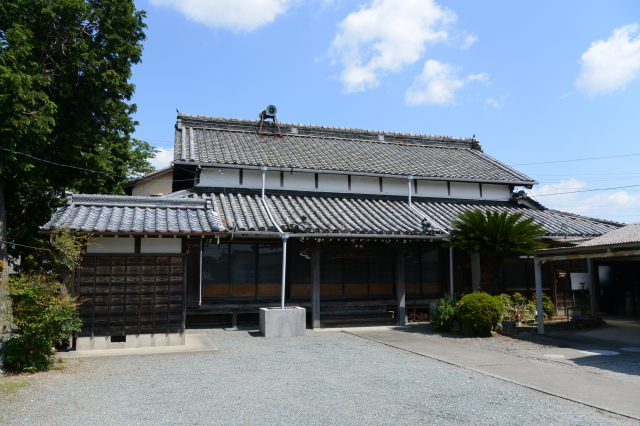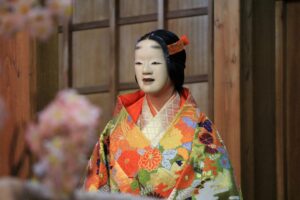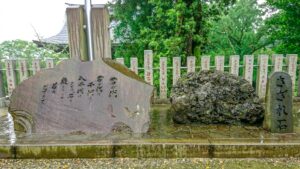What would you sacrifice to help others?
In a quiet village of Edo-period Japan, one humble magistrate made a choice that broke sacred taboos and cost him everything—but saved generations from hunger.
This is the true story of Buneemon Fukui, a man whose makoto, or sincere heart, reshaped not only the land, but the spirit of leadership itself.

✨1. A Leader’s Heart: When Law Meets Love✨
What does it mean to govern with the heart?
In a quiet village in 17th-century Japan, a local official named Buneemon Fukui faced a dilemma that tested not only the laws of his land but the depth of his compassion.
His decision would defy tradition, risk sacred taboos, and ultimately cost him his life.
Yet, more than 360 years later, his name is still remembered—not for power or glory, but for a single act of selfless love.
This is the story of a humble official, a forbidden waterway, and the timeless spirit of Japanese governance: shirasu, rule through empathy and responsibility.
🌿2. Sacred Boundaries and Moral Dilemmas🌿
In many parts of the world, the image of feudal lords and officials brings to mind systems of control, exploitation, and absolute authority.
But what if governance could be based not on domination, but on service and responsibility to the people?
In early modern Japan, there existed a unique philosophy of rule called shirasu—a term rooted in the ancient Japanese word shirasu, meaning “to know.”
Rather than ruling through force, a shirasu leader governed by deeply understanding and caring for the people, embodying a sense of moral stewardship rather than ownership.
Under this ideal, the ruler did not own the land or people, but was entrusted with their well-being by the authority of the emperor.
Yet even noble ideals can come into conflict with practical realities.
What happens when the duty to serve one’s people clashes with sacred traditions?
Can compassion ever justify breaking ancient taboos?
And what price must be paid for acting with love in a system bound by law and hierarchy?
The story of Buneemon Fukui begins with these very questions—questions that still speak to us today.
🍂3. The Night the Water Flowed—and a Life Was Given 🍂
In the mid-17th century, during Japan’s Edo period, Buneemon Fukui served as a local magistrate (daikan) under Lord Takayoshi Tōdō, a feudal lord of the Nabari domain.
When Lord Tōdō was transferred to Nabari in 1636, Fukui was appointed to oversee a rural area called Dema Village, located in present-day Mie Prefecture.
Dema was a fertile land, but the villagers lived in deep poverty.
Why? Because the village lacked a functioning irrigation system.
Without access to river water, they were entirely dependent on rain.
In years of drought, rice could not be grown. Families survived on okara rice—poor fare made from soybean pulp, barely enough to live on.
Fukui, upon his arrival, personally visited the villages and learned of their suffering.
He discovered that while the nearby Kushida River had ample water, the terrain around Dema was higher than the river, making irrigation seemingly impossible.
The only solution was to dig a new canal, starting from the eastern hills near Shimohataden, a higher point upstream.
But there was one overwhelming problem.
That land—Shimohataden—was part of the sacred grounds of the Ise Grand Shrine, Japan’s most revered Shinto sanctuary.
According to ancient tradition, no grass, tree, or stone within the sacred precinct was to be moved.
To violate this taboo was unthinkable—it was not merely a legal offense, but a spiritual transgression.
Still, on May 20, 1650, Buneemon Fukui summoned the villagers and issued an extraordinary order:
“Dig the canal. Begin tonight, and go straight east from Shimohataden.”
The villagers were shocked and afraid.
“That land is sacred!” they protested.
But Fukui replied calmly and confidently, “You need not worry. No harm shall come to you. Carry out the work as ordered.”
Moved by his courage and trust, the villagers agreed.
“If the magistrate has given his word, surely he has made arrangements with the domain and the shrine,” they thought.
That night, the villagers—men and women, young and old—gathered and dug with all their strength.
Fueled by hope and the dream of feeding their children, they worked through the night without rest.
By dawn, the canal was miraculously complete.
At sunrise, the final barrier was broken.
Water gushed into the canal.
For the first time, Dema Village had a steady, abundant water source.
Cheers rose. Some villagers wept. Faces covered in sweat and mud broke into joyful smiles.
But amidst the celebration, someone noticed something.
Fukui—the man who had ordered and overseen the construction—was missing.
Rushing to the magistrate’s office, the villagers found his lifeless body.
He had committed seppuku—ritual suicide.
Though his actions had saved the village, he had knowingly violated the sanctity of the shrine.
Rather than allow the domain or shrine to be punished, he took full responsibility with his own life.
Beside his body was a letter.
In it, he wrote:
“The water that flowed this morning is the gift of my life to Dema Village.
May your descendants know peace and abundance for generations to come.”
Even today, more than 360 years later, the villagers of Dema continue to hold a memorial service every year on the anniversary of Fukui’s death.
The Ise Grand Shrine itself has erected a stone monument in his honor—an extraordinary gesture, acknowledging not only the loss, but the love behind his act.
💫4. Makoto: The Sincerity That Transcends Judgment💫
Was Buneemon Fukui right or wrong?
If we judge strictly by law or tradition, he was wrong.
He violated sacred ground, broke ancient taboos, and disrupted the established order.
Others before him had refused to act precisely because they feared such consequences—and in doing so, they were technically correct.
But human hearts do not live by rules alone.
They are moved by compassion, shaped by courage, and awakened by acts of selfless love.
Fukui’s decision was not driven by rebellion or pride, but by his duty to the people, and his belief that no child should go hungry while the answer was within reach.
He knew the price he would pay.
And yet, he chose to act—not for reward or recognition, but so that generations to come could live in peace.
This was not just governance; it was sincerity in its purest form.
And this sincerity—what we might call makoto in Japanese—was not a momentary emotion, but the reflection of his entire life.
Fukui was known for his humble character, his devotion to duty, and his honest dealings.
He did not sacrifice himself to escape punishment or earn praise.
He had simply lived so truthfully that, when the time came to give everything, it was a natural extension of who he already was.
That is why his actions were not condemned, but honored.
That is why the Ise Shrine built a monument, not a barrier.
His story reminds us that governance is not about authority, but about responsibility.
And leadership is not about power, but about love.
🌸5. He Still Lives: Legacy in the Water, the Land, and the People🌸
Buneemon Fukui’s story is not just a tale from the past—it is a mirror for us today.
We live in a world full of laws, systems, and protocols.
But there are moments when we must ask ourselves:
What truly matters?
What does it mean to act with courage, with love, with makoto—sincerity?
Not every answer is clear.
Doing what is “right” is not always safe.
And sometimes, standing for others may mean standing alone.
But Fukui reminds us that even a single life, lived with unwavering integrity, can touch generations.
He reminds us that true leadership is measured not by authority, but by the lives it protects and uplifts.
More than 360 years have passed since that fateful night.
And yet, the villagers of Dema still remember him, still gather to honor him.
The Ise Grand Shrine itself, once the boundary he crossed, now holds a monument in his name.
It is not just a stone.
It is a sign that love, when rooted in selfless action, can transcend even the most sacred walls.
And so, Buneemon Fukui still lives—not just in memory, but in the flowing waters, the harvested fields, and the grateful hearts of the people he served.
In that quiet village, through every season,
he lives on.


